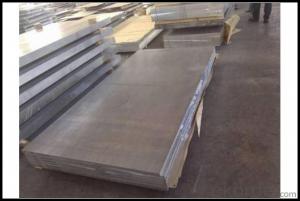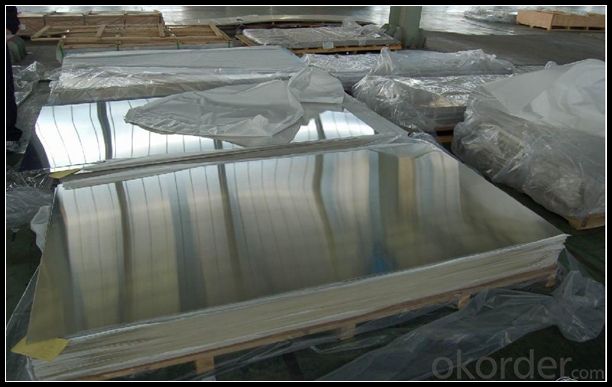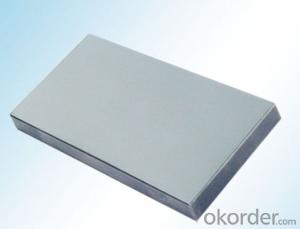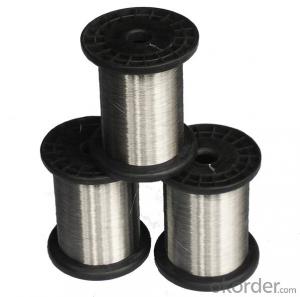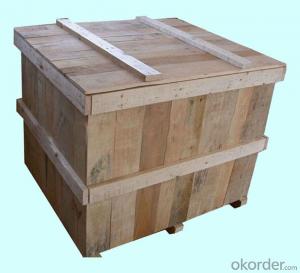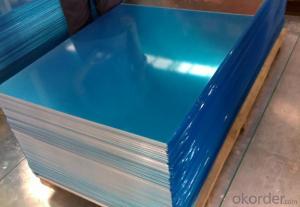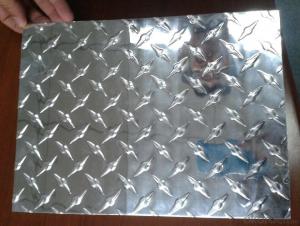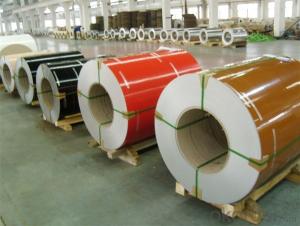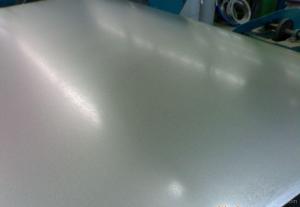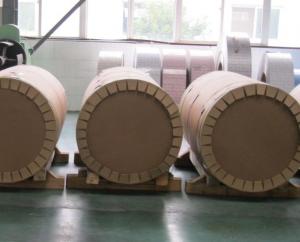Aluminum Sheets in South Carolina - Polished Aluminum Sheet Hot Rolled for Metal Walls
- Loading Port:
- Shanghai
- Payment Terms:
- TT OR LC
- Min Order Qty:
- 5 m.t.
- Supply Capability:
- 100000 m.t./month
OKorder Service Pledge
OKorder Financial Service
You Might Also Like
Specification
1.Structure of Polished Aluminum Sheet for Metal Walls
Aluminum Sheets are strengthened and cut from raw materials with different alloys, such as AA5005, AA5052, etc. They are easy for processing in different shapes, good in intensity and can be quickly installed. Aluminium Sheets for Energy Saving Curtain Walls are good in energy saving, weather resistance, fire resistance, easy for maintenance and with many colors.
Aluminium Sheets for Energy Saving Curtain Walls are widely used in construction of metal walls, metal ceilings, car decoration, advertizing panels, etc.
2.Main Features of Polished Aluminum Sheet for Metal Walls
•High intensity
•Easy to be processed and shaped
•Weather resistance
•Anti-pollution & environment protection
3. Polished Aluminum Sheet for Metal Walls Images
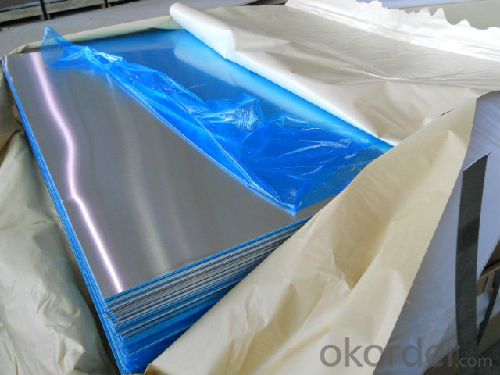
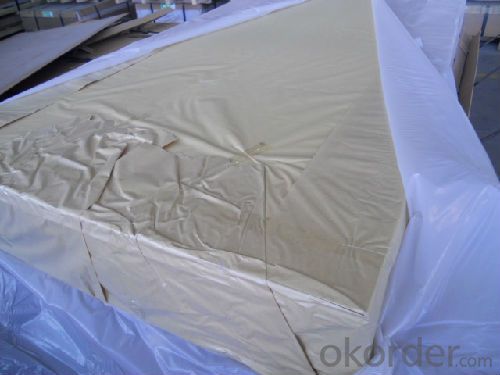
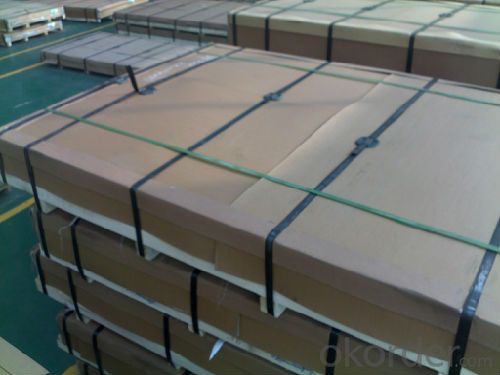
4.Specification of Polished Aluminum Sheet for Metal Walls
Alloy Number | AA5XXX |
Temper | H12, H14, H16, H18, H22, H24, H26, H32, HO, F |
Thickness | 0.1mm – 500mm |
Width | 10mm- 2200mm |
Standard | GB/T3880-2006, ASTM, ISO, EU standard |
5.FAQ
A.What about inspections to guarantee quality?
For each order for Aluminum Sheets with Mill Finished Surface AA5XXX, we will arrange strict inspection for raw materials, inspection during production and inspection for finished goods.
With requirement of customers, we also can arrange the third party inspection.
B.What about delivery?
We will put order for Aluminum Sheets with Mill Finished Surface AA5XXX in production schedule after order gets confirmed against copy of TT or L/C. Normally it takes about one month for production. Exact shipment schedule is different based on different sizes and quantity.
C.What is the MOQ?
5 tons for each size.
D. Where have you exported aluminium sheets?
We have exported aluminum sheets to many countries. Main markets include South East Asia, Middle East, North America, South America, etc.
- Q: What are the safety precautions when working with aluminum sheets?
- When working with aluminum sheets, some important safety precautions to consider include wearing appropriate personal protective equipment (PPE) such as gloves, safety glasses, and a dust mask to protect against cuts, eye injuries, and inhalation of aluminum dust. It is crucial to work in a well-ventilated area or use local exhaust ventilation to minimize exposure to dust and fumes. Additionally, ensuring that the work area is clean and free of clutter can help prevent slips, trips, and falls. Finally, it is essential to handle aluminum sheets with care to avoid sharp edges and to prevent heavy sheets from falling or causing injury.
- Q: What are the limitations of using aluminum sheet?
- There are several limitations to using aluminum sheet. Firstly, it has a lower strength-to-weight ratio compared to other materials like steel. This means that aluminum sheets may not be as strong and durable in certain applications. Additionally, aluminum is prone to corrosion, especially in harsh environments, so proper protective coatings or treatments are necessary. Aluminum sheets also have limited formability compared to materials like steel, which can impact their use in certain complex shapes or designs. Lastly, aluminum sheets can be more expensive than other materials, which may affect their affordability in certain projects.
- Q: This question asks about the various types of aluminum sheets that are commonly used for roofing purposes, including their specific applications and characteristics.
- <p>Aluminum sheets used for roofing come in various types, each with unique properties and applications. The main types include: 1) Corrugated Aluminum Sheets: Known for their strength and durability, these are often used in commercial and industrial roofing due to their ability to withstand harsh weather conditions. 2) Standing Seam Aluminum Sheets: These provide a sleek, clean look and are favored for their water-resistant properties, making them ideal for residential and architectural applications. 3) Flat Aluminum Sheets: Offer a smooth surface finish and are used where a uniform appearance is desired. 4) Perforated Aluminum Sheets: These have small holes that allow for ventilation, reducing heat build-up and are used in areas requiring natural light and air circulation. 5) Embossed Aluminum Sheets: With a textured surface, they provide added rigidity and are used in both residential and commercial settings for their aesthetic appeal. Each type is chosen based on the specific needs of the roofing project, such as design, weather resistance, and longevity.</p>
- Q: What are the different alloys available for aluminum sheets?
- Aluminum sheets offer a range of options when it comes to alloys, each with its own distinct properties and uses. Let's take a look at some of the most commonly used alloys: 1. 1100: This alloy is pure aluminum and boasts exceptional resistance to corrosion. It is perfect for applications that demand high levels of protection against corrosion, such as marine environments. 2. 3003: Another alloy that is purely aluminum, 3003 offers good formability, moderate strength, and high resistance to corrosion. It finds its place in general sheet metal work, chemical equipment, and cooking utensils. 3. 5052: Known for its impressive fatigue strength and outstanding resistance to corrosion, especially in saltwater settings, this alloy is often employed in marine applications, as well as aircraft components and fuel tanks. 4. 6061: As a heat-treatable alloy, 6061 showcases excellent weldability and formability, along with elevated strength and superb corrosion resistance. It is commonly utilized in structural components like frames, railings, and automotive parts. 5. 7075: This alloy stands out for its remarkable strength-to-weight ratio, making it perfect for aerospace applications and structural components that face high levels of stress. However, it is less resistant to corrosion than other alloys and may require protective coatings in specific environments. These examples represent only a fraction of the aluminum sheet alloys available. The choice of alloy relies on the specific requirements of the application, considering factors such as strength, corrosion resistance, formability, and cost. It is crucial to consult a knowledgeable supplier or engineer to determine the most appropriate alloy for your particular needs.
- Q: Which explains aluminum's resistance to corrosion? Any aluminum oxide that forms readily falls off the metal and exposes the corrosion-resistant metal. The aluminum oxide that forms adheres to the metal surface. The reduction half-reaction Al3+(aq) + 3e- ---gt; Al(s) occurs readily. The standard reduction potential for the Al3+/Al half-reaction is above the standard reduction potential for the O2/H2O half-reaction.
- i would start by plugging in some of those key terms into wikipedia. it often has shockingly good engineering physics articles. there are really only 4 variables: exhaust tube, annealing furnace, age hardened aluminum alloy. play with those, and you might find terms that lead you to your answer
- Q: What are the primary components that make up aluminum sheets?
- <p>Aluminum sheets are primarily composed of aluminum, which is a lightweight and malleable metal. They are made from pure aluminum or aluminum alloys, which may include small percentages of other elements to enhance specific properties such as strength, corrosion resistance, or workability. Common alloying elements include copper, magnesium, manganese, silicon, and zinc. The exact composition varies depending on the specific grade of aluminum and its intended use. Pure aluminum is soft and not commonly used for sheets; instead, alloys are preferred for their improved strength and durability.</p>
- Q: I would like to use an alloy of copper often called aluminum bronze or aluminum brass for making wire wrapped jewelry but I am unable to find a supplier. An alloy that has no zinc or lead would be best to avoid toxicity problems. This alloy should be principally copper and aluminum but other added materials would be acceptable if not toxic. Nickel, silicon, manganese, and iron are sometimes added to increase performance of the alloy and should be acceptable (no lead or zinc please). The material obviously needs to be bendable enough to work with wire wrapping so if it is brittle it will not work. It should then be at least as usable as aluminum, copper, or stainless steel wire.
- My lady I nonetheless use it to cook dinner my hams and turkeys and to store meals in the frig, however its fitting a dinosaur and its on its last leg and there may be so many different matters now we can use but up to now years it had its use but science and Tech. Has come and made it out of date. However still I like to apply it to ocassions
- Q: Can aluminum sheets be embossed?
- Indeed, it is possible to emboss aluminum sheets. The act of embossing entails producing a design that is elevated or inset on the surface of a material. Aluminum is a versatile substance that can be easily manipulated, including being subjected to embossing. One can employ different techniques in order to emboss aluminum sheets, such as heat embossing or using tools and machines specifically designed for embossing. By undergoing the embossing process, the aluminum sheets gain texture and depth, resulting in an enhanced appearance suitable for a wide range of applications. These applications may include decorative purposes, signage, nameplates, and even the addition of texture to automotive or architectural accents.
- Q: Can aluminum sheets be used for food display cases?
- Indeed, aluminum sheets are suitable for food display cases. Owing to their remarkable strength, durability, and resistance to corrosion, aluminum is widely favored for such purposes. Furthermore, the lightweight nature of aluminum facilitates the handling and transportation of these display cases. The clean and sleek look of aluminum also enhances the presentation of food items, making it an ideal material for showcasing a variety of foods. Additionally, aluminum is non-toxic and does not interact with food, guaranteeing the safety and hygiene of the displayed items. Ultimately, aluminum sheets are a suitable and pragmatic option for constructing food display cases.
- Q: What is the fatigue strength of aluminum sheets?
- The fatigue strength of aluminum sheets can vary based on several factors, including the composition of the alloy, thickness, condition of the surface, and the specific loading conditions. When compared to other metals, aluminum alloys typically exhibit favorable fatigue strength. To determine the fatigue strength of aluminum sheets, fatigue testing is commonly employed. This involves subjecting specimens to cyclic loading until failure. The fatigue behavior of aluminum sheets is characterized by the S-N curve, which represents the relationship between the applied stress amplitude (S) and the number of cycles to failure (N). Aluminum alloys, such as 2024-T3 and 6061-T6, are frequently used in industries like aerospace and automotive due to their high fatigue strengths. These alloys can endure millions of cycles at specific stress levels. For instance, at 10^6 cycles, 2024-T3 aluminum alloy has a fatigue strength of approximately 105 MPa (15,000 psi), while 6061-T6 aluminum alloy has a fatigue strength of around 96 MPa (14,000 psi). It is worth noting that the fatigue strength of aluminum sheets can be influenced by various factors, including surface defects, corrosion, temperature, and loading frequency. To enhance the fatigue strength, it is important to properly prepare the surface by smoothing it and eliminating sharp edges. Additionally, the use of appropriate stress relief treatments and design considerations, such as avoiding stress concentrations and optimizing joint design, can also improve the fatigue performance of aluminum sheets. In conclusion, the fatigue strength of aluminum sheets is generally considered good. However, it is crucial to consider the specific alloy, thickness, surface condition, and loading conditions in order to accurately determine and optimize the fatigue performance in practical applications.
Send your message to us
Aluminum Sheets in South Carolina - Polished Aluminum Sheet Hot Rolled for Metal Walls
- Loading Port:
- Shanghai
- Payment Terms:
- TT OR LC
- Min Order Qty:
- 5 m.t.
- Supply Capability:
- 100000 m.t./month
OKorder Service Pledge
OKorder Financial Service
Similar products
Hot products
Hot Searches
Related keywords
